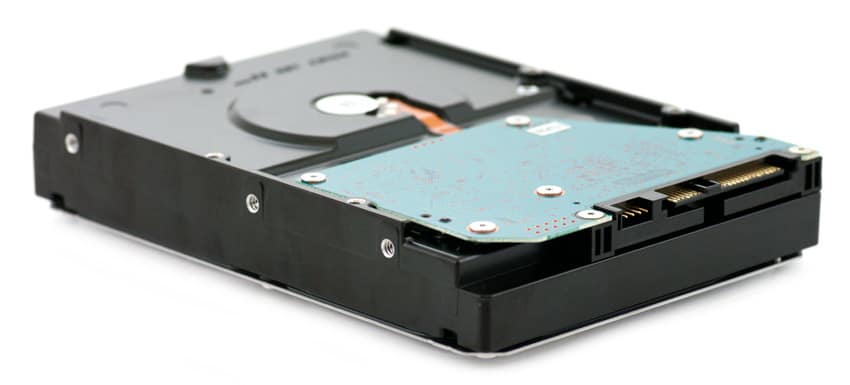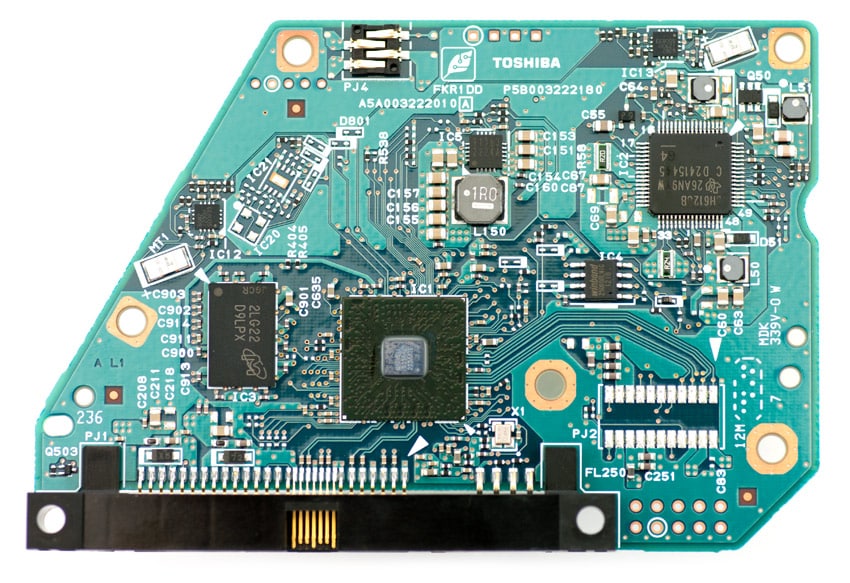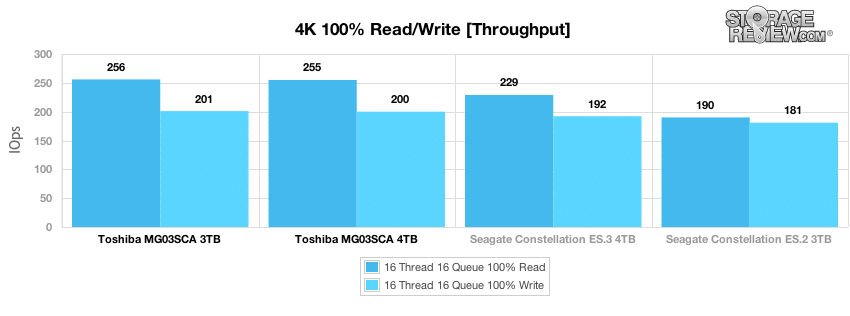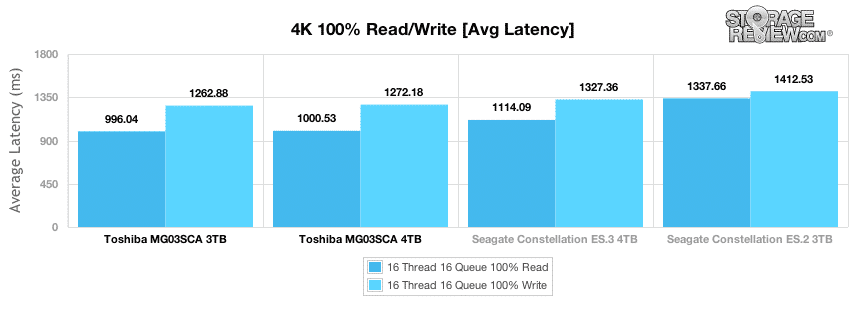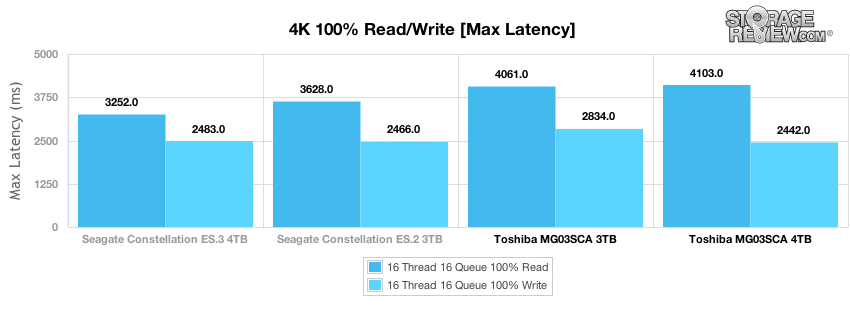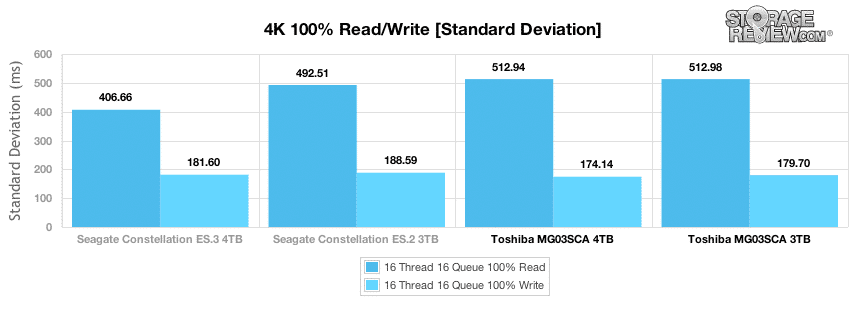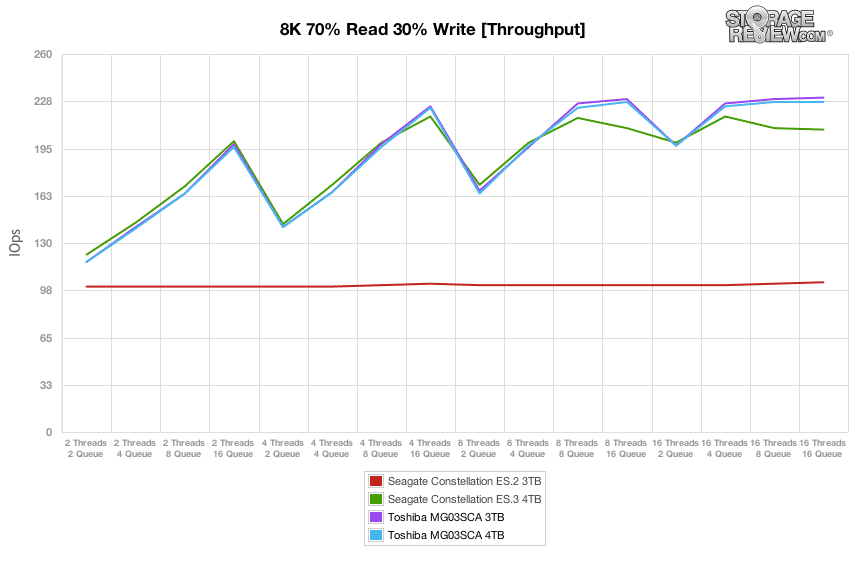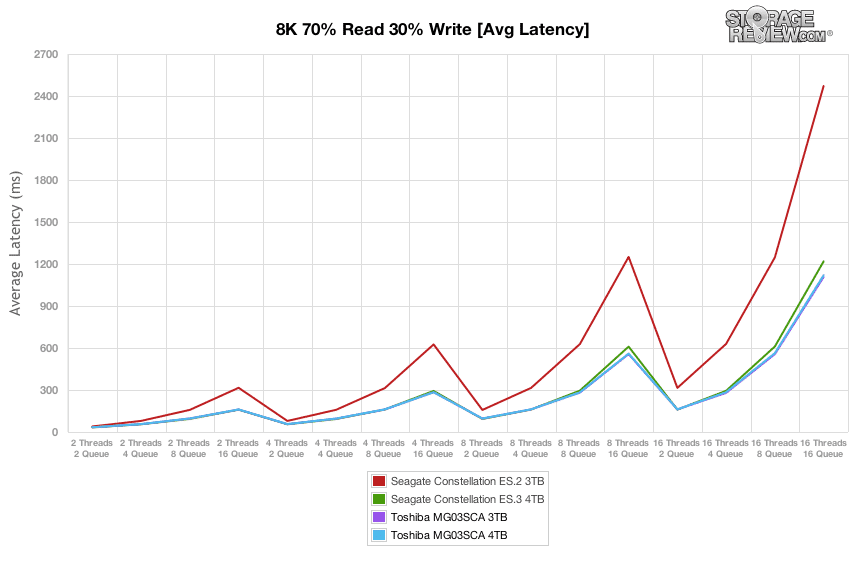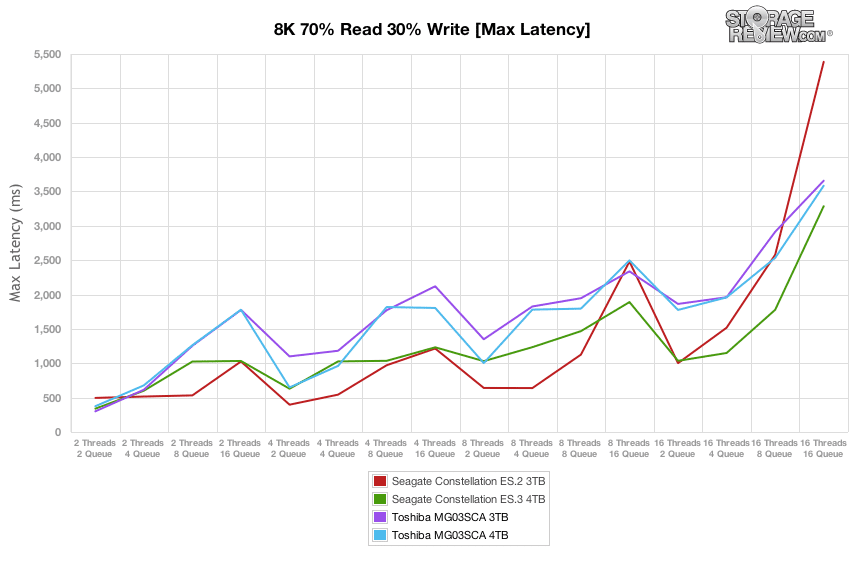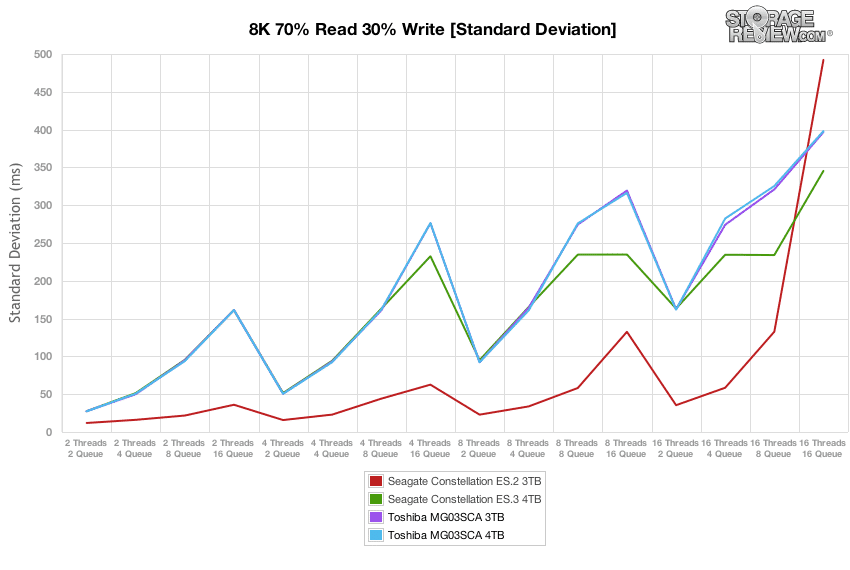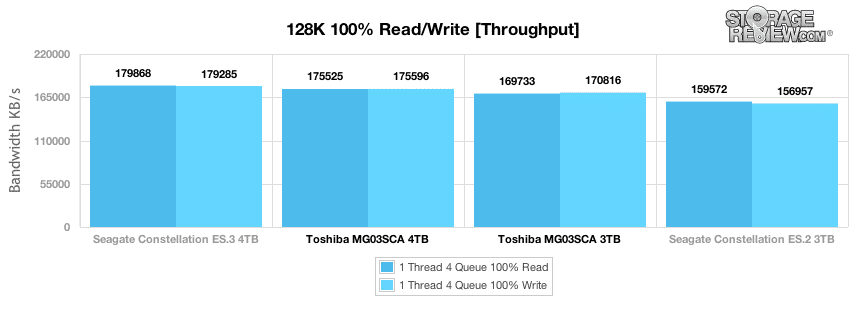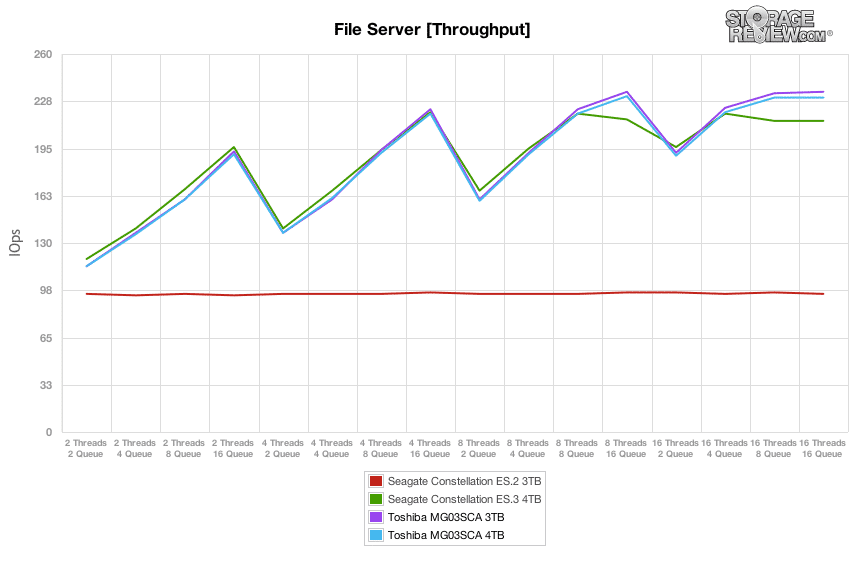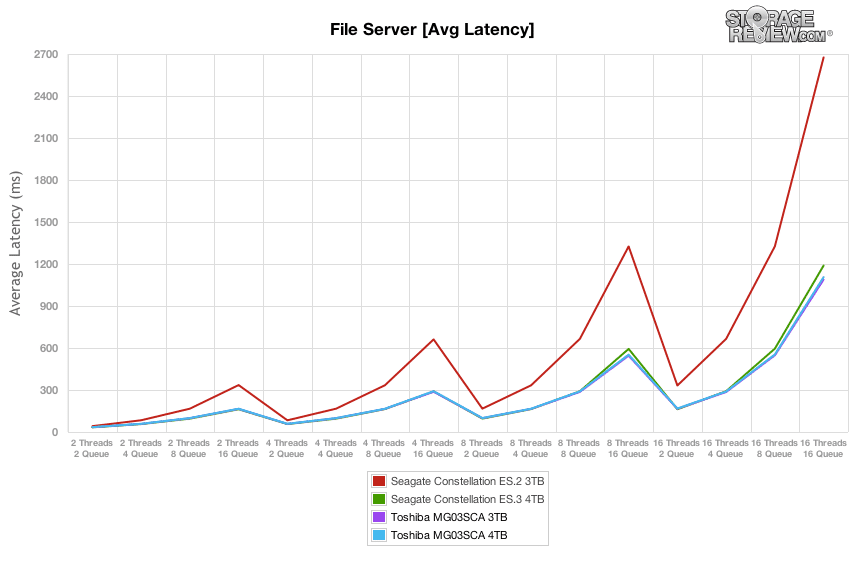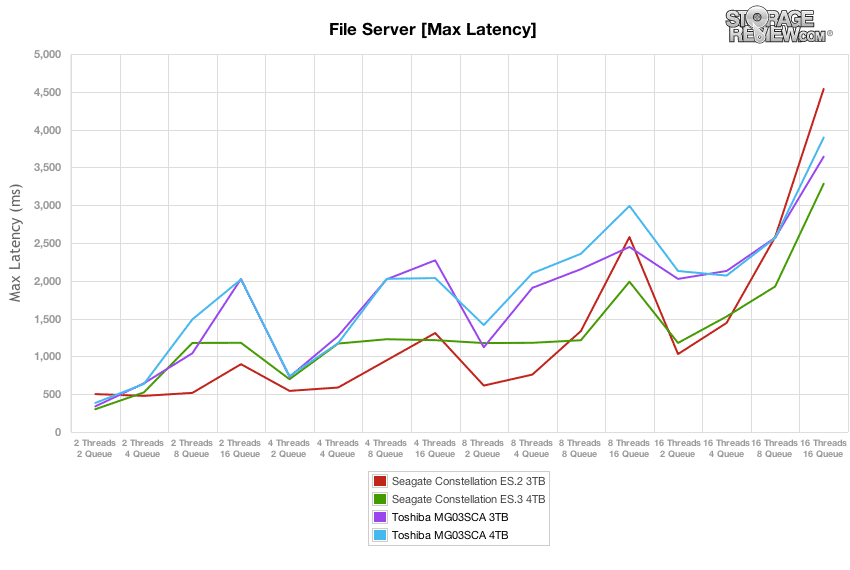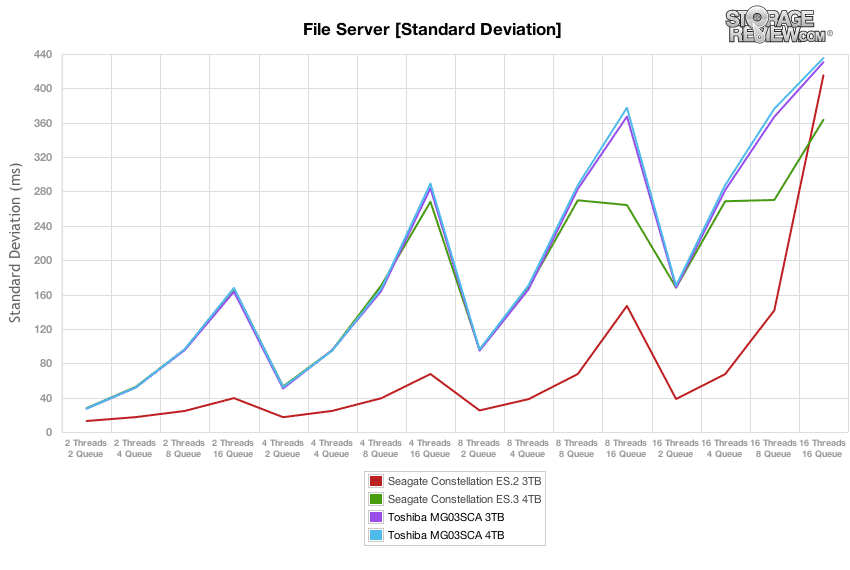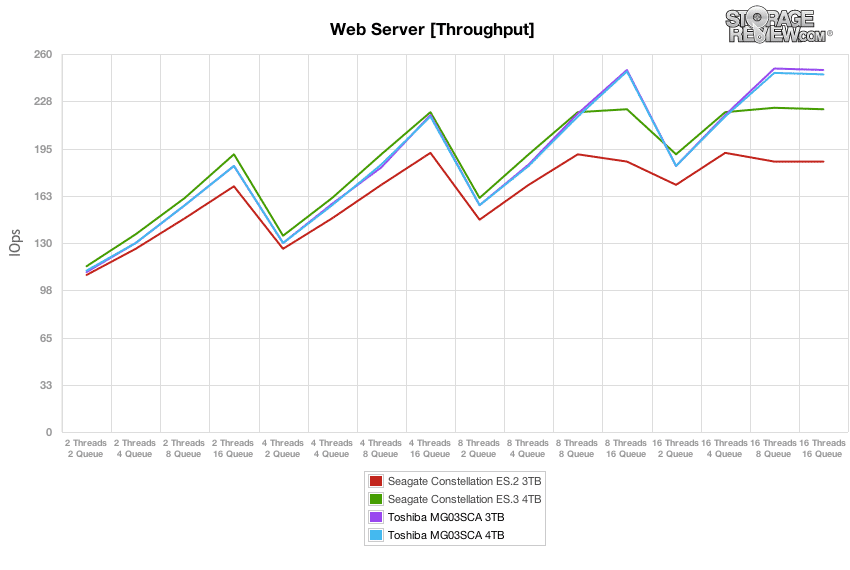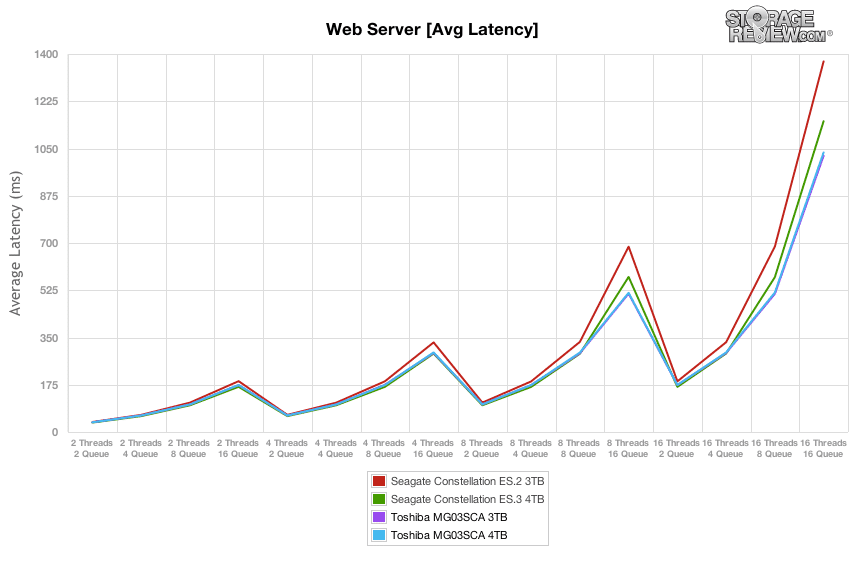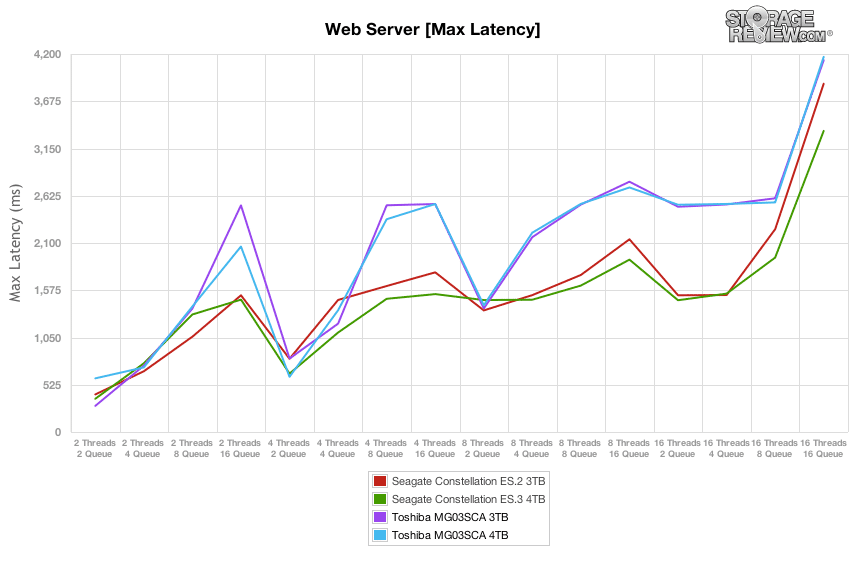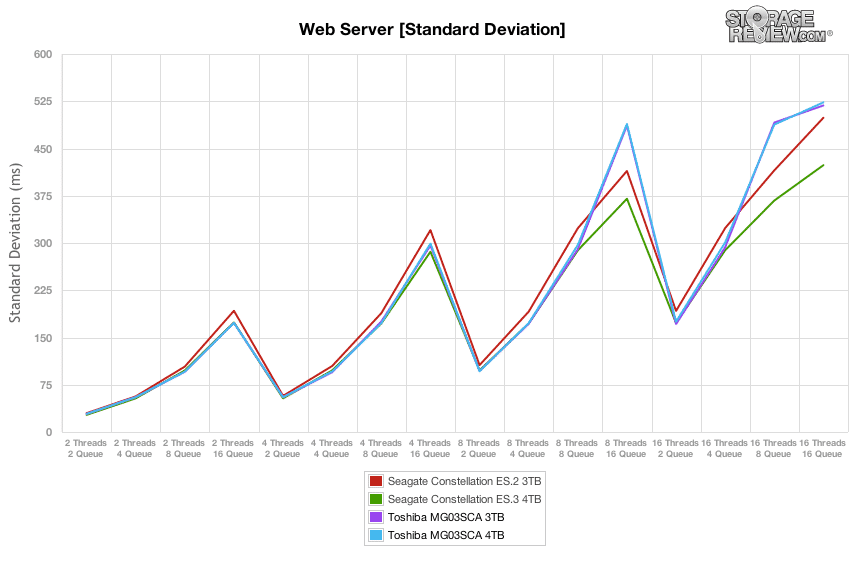
Toshiba’s new MG03 SAS Enterprise 3.5″ hard drives offer a 7,200 RPM spindle speed with top-of-the-line capacities up to 4TB and SAS 6Gb/s interface in either standard or encrypted (SED) models. The encryption feature is part of a push Toshiba is mounting to provide more security options across all new drives. The MG03 SAS Enterprise drives present a host of updates compared to the previous generation. Toshiba expanded capacities up to 4TB from 2TB, and the MG03 SAS drives now offer up to 18% faster sustained transfer rates while shaving power consumption up to 15%. Additionally, the drives offer cache buffers of 64MB, which is a significant bump from the previously offered 16MB buffers. The drives also offer error correction (ECC) for more reliability. All told, the latest MG03 offering is on more even terms with other leading drives in the high-capacity enterprise SAS space and aims to be a viable option in a market long dominated by other drive vendors.
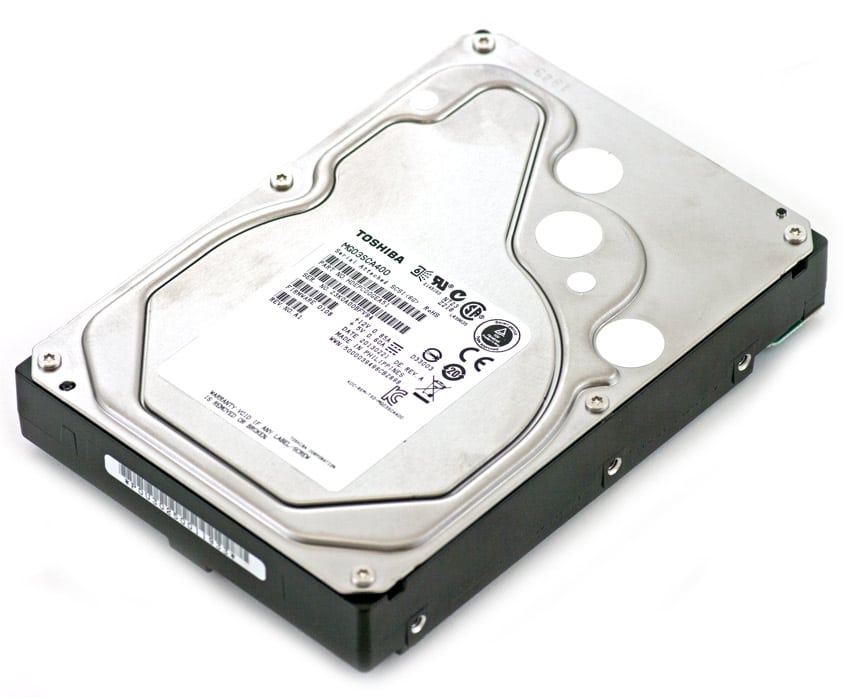
We anticipate adoption rates of these drives and comparables in the market now offered at 4TB to start picking up. Many in the space have been waiting to upgrade from their current 1TB or 2TB drives to make the dramatic step up to a far greater capacity at 4TB instead of 3TB drives. With economics playing a big role in the appropriate drive design for the space, Toshiba has manufactured these drives with a range of workloads in mind that don’t require the very highest-end performance, but do require robust storage capacity. These drives are prepared for server workloads, SAN and NAS devices, cloud file and object-oriented storage as well as disk-to-disk data protection applications. Additionally, they offer maximum transfers up to 165MB/s. One more noteworthy feature of the MG03 SAS drives is that internally, there are 5 platters at 800GB each on 4TB models and 4 platters at 750GB each on 3TB drives.
The Toshiba MG03 SAS 3.5″ drives come with a 5-year warranty. Toshiba offers a SATA interface as well, which we will review in a forthcoming piece. Our review models are the standard (unencrypted) 3TB and 4TB drives.
Toshiba MG03 SAS Enterprise 3.5″ Specifications
- Capacities
- 1TB
- Standard (MG03SCA100)
- SED (MG03SCP100)
- 2TB
- Standard (MG03SCA200)
- SED (MG03SCP200)
- 3TB
- Standard (MG03SCA300)
- SED (MG03SCP300)
- 4TB
- Standard (MG03SCA400)
- SED (MG03SCP400)
- 1TB
- Performance
- Rotational Speed: 7,200 RPM
- Average Latency: 4.17ms
- Maximum sustained transfer rate :165 MB/s (4TB models); 155 MB/s (1TB, 2TB, 3TB models)
- Buffer Size: 64MiB FIFO ring buffer
- Encryption
- TT10 SANITIZE crypto-erase and TCG-Enterprise SSC (SAS models)
- T13 SANITIZE crypto-scramble and T13 ATA security erase (SATA models)
- Power
- Voltage 5V±5% , 12V±5%
- Read/Write Power: 11.3 watts
- Low Power Idle: 6.0 watts
- Environmental
- Temp – Operating: 5° to 55°C (41° to 131°F)
- Temp – Non-Operating: -40° to 70°C
- Vibration – Operating: 7.35 m/s2 (0.75G, 5300Hz) / 2.45 m/s2 (0.25G, 300500Hz)
- Vibration – Non-Operating: 49 m/s2 (5G, 5500Hz)
- Shock – Operating: 686 m/s2 (70G) 2ms
- Shock – Non-Operating: 2,940 m/s2 (300G) 2ms
- Acoustics (idle) 31 dB
- MTTF: 1,200,000 hours
- Load/Unload: 600,000 times
- Dimensions (WxDxH) 101.6 mm x 147 mm x 26.1 mm
- Weight: 720g (Max)
- 5 Year Warranty
Design and Build
Toshiba MG03 SAS enterprise hard drives are metallic silver on black. The cover is affixed to the body with six screws, and it also has a separate inlay in the center that features a product information label. Additionally, there are 5 white stickers spread across the top of the drive. The sides of the MG03 SAS enable mounting via six screw holes, three per side. Shifting to the back of the drive, the lone features are the interface connectors for installation.
The body of the Toshiba MG03 SAS is solid black. The bottom of the drive holds the circuit board which can easily be taken off by removing 4 short screws and 2 long screws. On the circuit board, Toshiba has carefully installed a foam pad between the drive and circuit board to absorb vibrations.
The circuit board includes a Marvell controller chip, 64MB of DRAM from a Micron module, and a Texas Instruments motor driver. Meanwhile, inside of the drive there are 5 platters at 800GB each on 4TB models and 4 platters at 750GB each on 3TB drives.
Testing Background and Comparables
7,200RPM Enterprise SAS HDD comparables for this review:
All enterprise HDDs are benchmarked on our enterprise testing platform based on a Lenovo ThinkServer RD240. The ThinkServer RD240 is configured with:
- 2 x Intel Xeon X5650 (2.66GHz, 12MB Cache)
- Windows Server 2008 Standard Edition R2 SP1 64-Bit and CentOS 6.2 64-Bit
- Intel 5500+ ICH10R Chipset
- Memory – 8GB (2 x 4GB) 1333Mhz DDR3 Registered RDIMMs
- LSI 9211 SAS/SATA 6.0Gb/s HBA
Enterprise Synthetic Workload Analysis
Our enterprise hard drive benchmark process preconditions each drive into steady-state with the same workload the device will be tested with under a heavy load of 16 threads with an outstanding queue of 16 per thread, and then tested in set intervals in multiple thread/queue depth profiles to show performance under light and heavy usage. Since hard drives reach their rated performance level very quickly, we only graph out the main sections of each test.
Preconditioning and Primary Steady-State Tests:
- Throughput (Read+Write IOPS Aggregate)
- Average Latency (Read+Write Latency Averaged Together)
- Max Latency (Peak Read or Write Latency)
- Latency Standard Deviation (Read+Write Standard Deviation Averaged Together)
Our Enterprise Synthetic Workload Analysis includes four profiles based on real-world tasks. These profiles have been developed to make it easier to compare to our past benchmarks as well as widely-published values such as max 4k read and write speed and 8k 70/30, which is commonly used for enterprise drives. We also included two legacy mixed workloads, the traditional File Server and Webserver, each offering a wide mix of transfer sizes.
- 4k
- 100% Read or 100% Write
- 100% 4k
- 8k 70/30
- 70% Read, 30% Write
- 100% 8k
- 128k
- 100% Read or 100% Write
- 100% 128k
- File Server
- 80% Read, 20% Write
- 10% 512b, 5% 1k, 5% 2k, 60% 4k, 2% 8k, 4% 16k, 4% 32k, 10% 64k
- Webserver
- 100% Read
- 22% 512b, 15% 1k, 8% 2k, 23% 4k, 15% 8k, 2% 16k, 6% 32k, 7% 64k, 1% 128k, 1% 512k
In our first workload with 100% random 4k transfers, we measured 255 IOPS read from the Toshiba MG03SCA 4TB and 200 IOPS write. These figures led the class along with the 3TB model.
In our main average latency segment with a load of 16T/16Q, we measured an average read latency of 1000.53ms and a write latency of 1272.18ms from the Toshiba MG03SCA 4TB which bested the Seagate drives and was right on the mark with the sibling 3TB drive.
With just read activity, the Toshiba MG03SCA 4TB registered a max response time of 4103.0ms with write activity max latency at 2442.0ms. While max read latency was the highest, write latency was the lowest.
Reviewing the 4k latency consistency in our standard deviation section, the Toshiba MG03SCA 4TB tested at 512.94ms for read activity, and 174.14ms for write activity.
Compared to the fixed 16 thread, 16 queue max workload we performed in the 100% 4k write test, our mixed workload profiles scale the performance across a wide range of thread/queue combinations. In these tests, we span workload intensity from 2 threads and 2 queue up to 16 threads and 16 queue. In the expanded 8k 70/30 test, the Toshiba MG03SCA 4TB and 3TB edged out the Seagate ES.3 with the 4TB peaking at 227 IOPS.
Evaluating the 8k 70/30 average response times, the Toshiba MG03SCA 4TB and 3TB drives maintained a consistency throughout the testing and managed to edge out the Seagate ES.3 with the lowest response times throughout all queue depths.
Over the duration of our primary tests at varying thread and queue depth levels, the Toshiba MG03SCA 4TB had the third lowest max latency at 375ms for the 2 threads and 2 queue depth level. At the 16 thread and 16 queue depth level, it had the second lowest max latency of 3,583ms.
For the entire thread/queue spectrum, the Toshiba maintained latency similar to the Seagate ES.3.
Our 128k test is a large block sequential test which shows the highest sequential transfer speed for a platter drive. Taking a look at 128k performance for both 100% write and 100% read activity, the Toshiba MG03SCA 4TB measured competitively at 175525 KB/s read and 175596 KB/s write.
The next workload we used is our File Server profile which puts the drives through a varying workload. We scaled the thread and queue count from 2T/2Q up to 16T/16Q. In this profile, the Toshiba drives ranked at the front of the pack near 230IOPS.
At all queue depths, the Seagate ES.3 and Toshiba drives were pacing near each other, though the Toshiba drives edged out the ES.3. The Toshiba 4TB peaked at 1,106ms.
Comparing peak response times in our File Server profile, the Toshiba MG03SCA 4TB had several peaks that put its latency near the bottom middle of the pack.
Looking at the latency standard deviation, the Toshiba MG03SCA 4TB came in at the bottom of the pack in latency consistency.
Our final test is the Web Server test, which is traditional 100% read activity. The Toshiba MG03SCA 4TB was at the top of the group with the 3TB model most of the time, ranging up toward 250IOPS.
All drives performed competitively in our next test of average latency in the Web Server profile, though the Toshiba drives edged out the best numbers again.
For the duration of the varying loads in our Web Server profile, the Toshiba drives were less consistent than the Seagate drives which peaked less often and stayed lower overall.
Comparing latency consistency in our read-only Web Server profile, the Toshiba MG03SCA 4TB and 3TB performed similarly and performed near the Seagate drives aside from a couple of peaks at 8T16Q and 16T8Q.
Conclusion
The Toshiba MG03 SAS drives feature several enhancements over the previous generation drives and are offered with capacities at the current industry maximum of 4TB. The drives provide that robust capacity while spinning at 7,200 RPM. Toshiba rates the MG03 SAS at speeds up to 18% faster for sustained transfer rates while still decreasing power consumption up to 15%. Another significant feature Toshiba is universally adding across their drives is optional encryption. These drives are designed primarily with the following applications in mind: server workloads, SAN and NAS, cloud storage and disk-to-disk data protection.
In our testing, the Toshiba MG03 SAS drives outperformed the Seagate ES series drives in producing robust IOPS in each category, though they sometimes produced more latency. The MG03 4TB SAS was routinely at the top of the list when it came to throughput and average latency, producing numbers that were similar or far better than the competition. This was the case in our random 4k transfers, our 8k 70%/30% worklaods, the large block sequential 128k testing, as well as the file and web server testing. However, it was also the case that the Toshiba MG03 SAS 4TB often produced greater max latency and standard deviation.
Overall, performance from the Toshiba MG03 SAS was high with the 3TB and 4TB SAS models leading the way in many of our mixed workloads. Compared to the Seagate Constellation ES.3 model, the Toshiba SAS HDD offered better high-end performance, while the Seagate model edged it out slightly at low thread/queue counts. One weakness we spotted in the Toshiba HDD though was that pushing the thread/queue count higher to fully saturate the drive did cause peak latency to increase above the comparable 7,200RPM SAS models.
Pros
- Excellent performance in randomized workloads
- Strongest 4K random read and write performance in its category
- Available in encrypted versions
Cons
- Higher peak latency than SAS competitors
Bottom Line
The Toshiba MG03 SAS 4TB is a capacity-driven enterprise drive that offers solid performance and meets the needs of organizations that have waited out 3TB drives in favor of more robust 4TB models with added features such as optional encryption.

